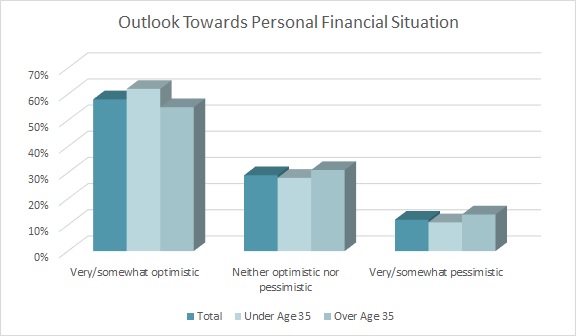After more than a year-and-a-half of dealing with Covid-19 and the ensuing upheaval surrounding it, a new survey shows consumers around the world are feeling a range of emotions — some of them perhaps surprising — about everything from their financial futures to shopping to sustainability and the environment. The research also shows windows of opportunity exist for the makers and retailers who take the time to discern what shoppers really want and need right now.
Globally, many consumers report they were significantly impacted by the pandemic, resulting in reduced income (40 percent) and a decline in apparel spending (55 percent), according to the Cotton Council International & Cotton Incorporated’s 2021 Global Lifestyle Monitor™ Survey. Still, most (58 percent) are very/somewhat optimistic about their financial futures. Moreover, those under age 35 are significantly more optimistic than their older counterparts (62 percent versus 55 percent).

Almost 4 in 5 consumers (78 percent) say they still love/somewhat like clothes shopping and, going forward, almost all (97 percent) expect to buy apparel in the coming year, according to the 2021 Global Lifestyle Monitor™ Survey. Nearly half of all consumers (48 percent) plan to purchase at least 50 percent or more of their clothes online in the future. But consumers are also looking forward to shopping in physical locations like department stores (61 percent), mass merchants/hypermarkets (57 percent), chain stores (56 percent), discounters (55 percent), specialty stores (52 percent), independent boutiques, sporting goods stores and street markets (all 51 percent), and factory outlets (42 percent), according to the survey. Something for buyers to keep in mind, though: most (68 percent) expect to buy less than usual.
When it comes to what they plan to buy, 83 percent of shoppers say they expect to purchase more comfortable clothes, according to the 2021 Global Lifestyle Monitor™ Survey. So it makes sense that when deciding whether or not to buy an item of clothing, comfort (87 percent) is ranked as the top purchase driver. That’s followed by fit (84 percent), overall quality (83 percent), durability (79 percent), finish and price (both 71 percent), style (70 percent), performance features (68 percent), environmental friendliness (60 percent), brand name (39 percent) and manufacturing country (35 percent), according to the survey.
Industry makers should note that 76 percent of consumers around the globe say they will pay more for better quality clothes, according to the 2021 Global Lifestyle Monitor™ Survey. And nearly three-quarters (71 percent) say they will pay more for environmentally friendly clothes.
In keeping with their desire for cozy, eco-conscious apparel, most consumers (60 percent) say they would pay more money for clothes made from cotton versus synthetics (11 percent), according to the 2021 Global Lifestyle Monitor™ Survey. Further, more than 4 in 5 global consumers (82 percent) say they would prefer that the clothes they wear the most be made of cotton.
Around the world, the majority of shoppers agree that compared to clothes made from synthetic fibers, cotton apparel is the most comfortable (77 percent), most sustainable (71 percent) and longest lasting (58 percent), according to the 2021 Global Lifestyle Monitor™ Survey.
Over the last year, sustainability has grown in importance among consumers. The 2021 Global Lifestyle Monitor™ Survey found 80 percent of consumers believe environmental change and resource depletion “are very real and require changes in our behavior.” Concern about sustainability and the environment has increased among more than half of all global consumers (56 percent), while 35 percent have remained at a similar or the same level of concern. When it comes to fibers that are safe for the environment, consumers rank cotton at the top (71 percent), followed by wool (65 percent) and hemp (59 percent). Manmade fibers like rayon (45 percent) and polyester (33 percent) ranked lowest, according to the survey.
A study based on the 2021 Global Lifestyle Monitor™ Survey offers recommendations for the industry as the world’s continues to live with and adapt to Covid-19 and its aftermath. Among them, manufacturers and retailers are advised to monitor the longer-term implications of the pandemic and economy. And they’re urged to closely track attitudes and behaviors in an effort to guide product mix, price points, channel priorities, communications, and customer experience.
The 2021 Global Lifestyle Monitor™ report also points out that as consumers return to regular clothes shopping, they will be more selective and intentional in their decisions. With that, retailers are advised to avoid compromising long-term success by lowering prices in an effort to garner short-term sales boosts. This, the study states, can damage product perceptions longer term.
As for responding to the “next normal” in shopper behavior, the report says retailers and brands should ensure online experiences are as seamless as possible, since the shift to ecommerce is likely to continue. However, the 2021 Global Lifestyle Monitor™ study suggests stores continue to optimize the brick-and-mortar experience, as this is still dominant in most markets.
It’s also recommended the industry immediately and urgently develop a strategy to address sustainability and the environment, concerns that have increased among global consumers over the past year. The 2021 Global Lifestyle Monitor™ Study points out that while consumers around the world are willing to assume personal responsibility to prevent climate change, they expect their own governments and businesses to do so, as well. To that end, it’s suggested the industry work cooperatively with competitors to share learning and implement best practices. As well, fashion as a whole should discourage the production of “fast fashion.”
Finally, the 2021 Global Lifestyle Monitor™ Study recommends that for consumers’ sakes, the industry provide information about what constitutes environmentally friendly apparel and create a symbol that signifies adherence to specific sustainability guidelines. Additionally, brands are encouraged to support influencers who are likely to persuade their followers to make environmentally positive choices. And — for any skeptics — it should be made clear that environmentally friendly clothes do not have a negative impact on comfort, quality and durability.
